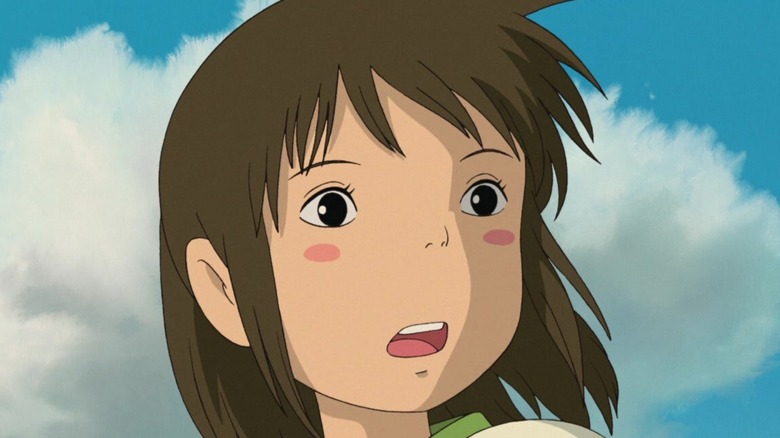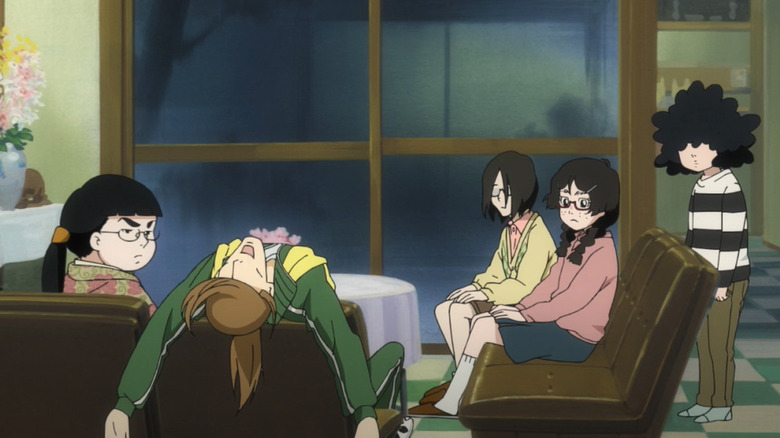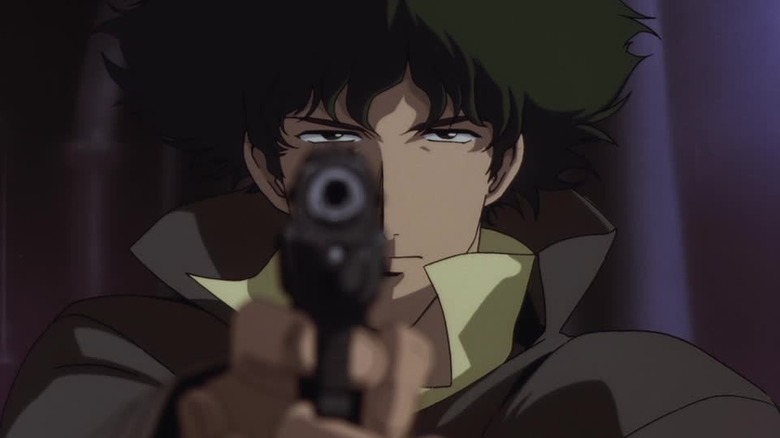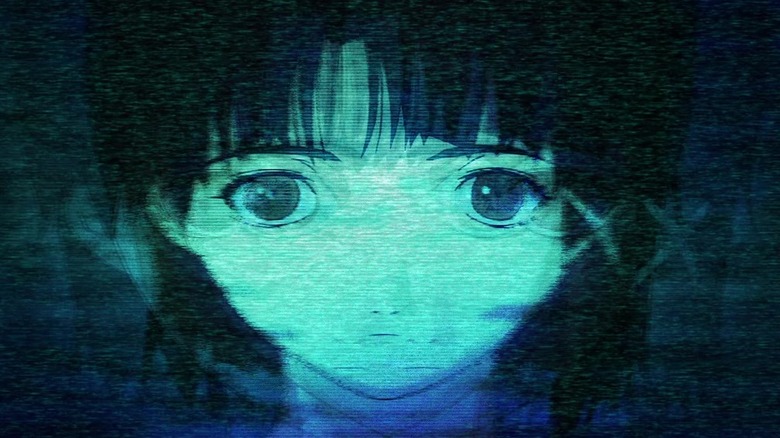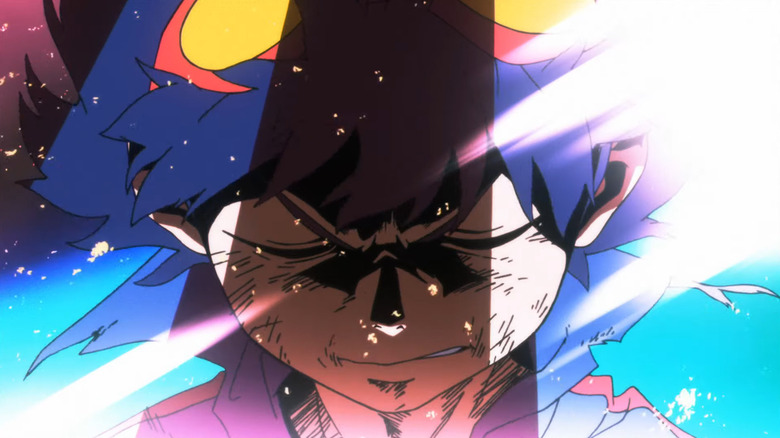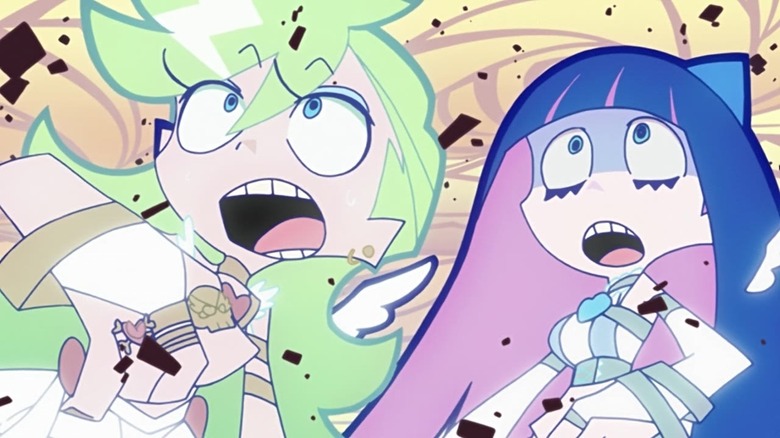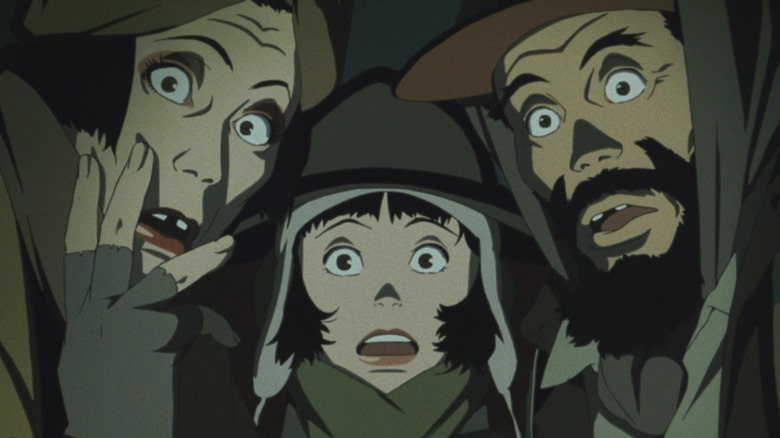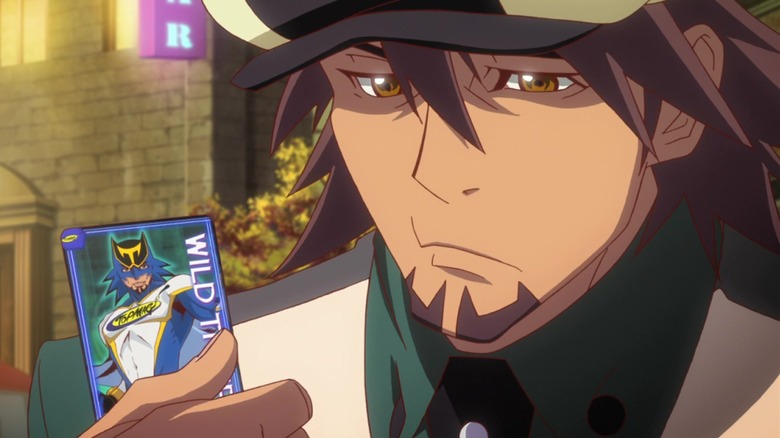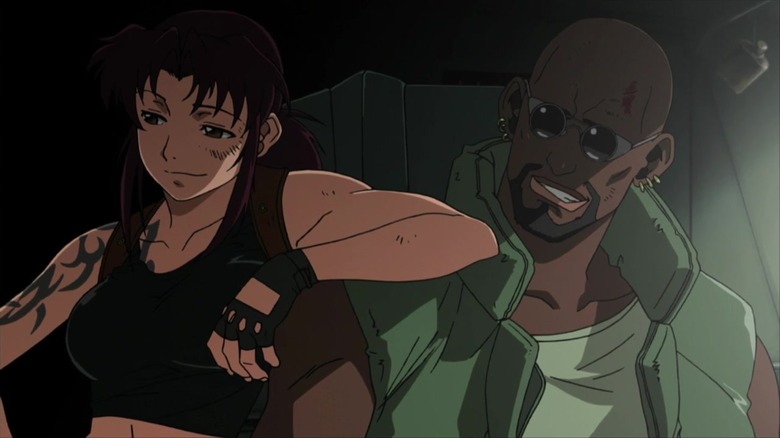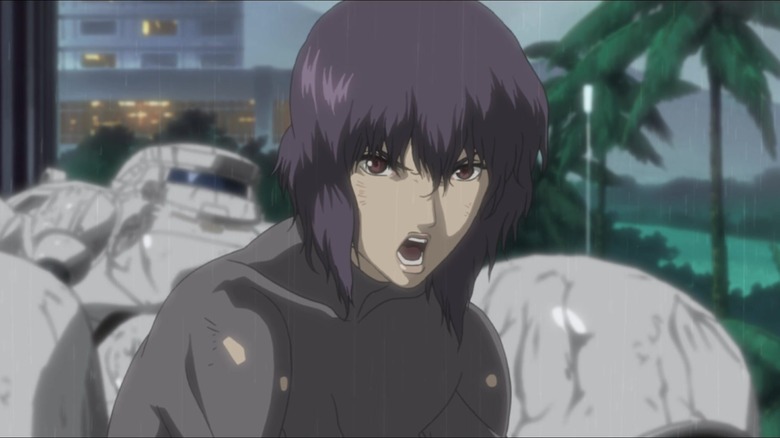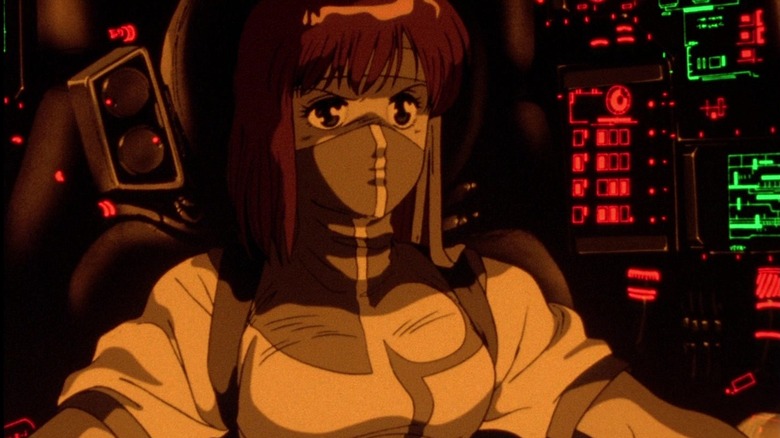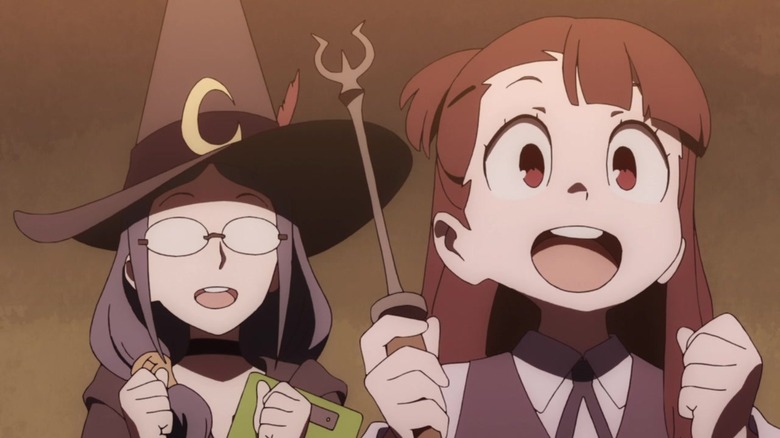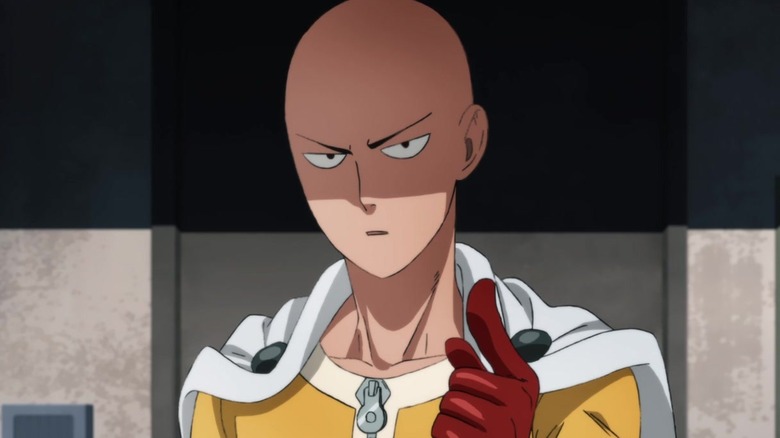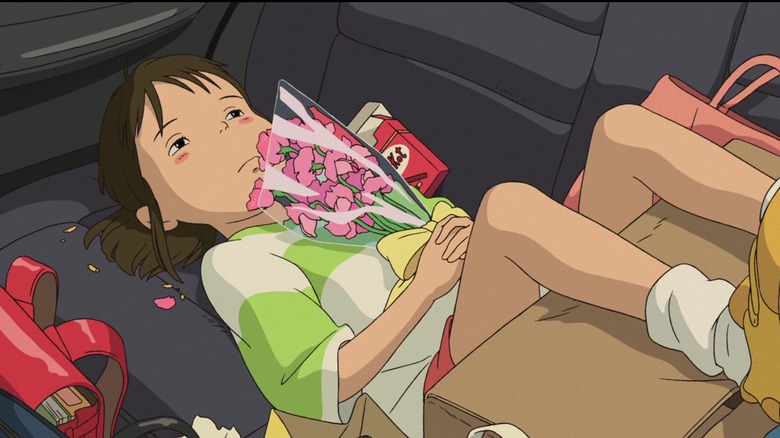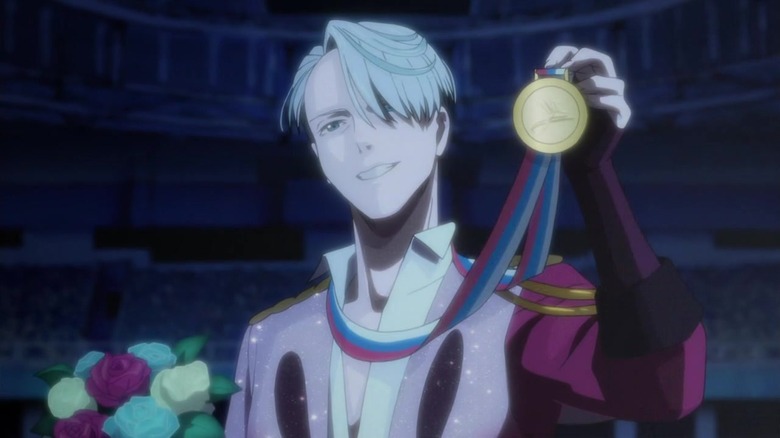The Best Anime To Watch If You're An Anime Newbie
"Anime" is a small word for what is a vast, complex world of media. Genre, visual style, and demographic targets vary wildly from production to production: Both "Ping Pong the Animation," which explores adolescence through the nail-biting world of table tennis, and "Thermae Romae," which follows a time-traveling architect as he uses modern Japanese technology to build the greatest bathhouses Ancient Rome has ever seen, fall under the same anime umbrella, yet couldn't be more different. This immense diversity means that being an anime fan is never boring. Unfortunately, it also means that becoming an anime fan is an increasingly intimidating challenge.
Should an anime neophyte start with series set in the real world, or ones that embrace the field's most out-there instincts? Is it better to jump in through movies or series? Which older productions are suitable for a complete newbie, and which are better enjoyed once one has the lay of the land?
All of these questions are worth asking, yet all are capable of overwhelming a curious newcomer. Luckily, we've considered them for you, and assembled this guide for all prospective fans in need of guidance. These are the best anime movies and series to watch if you're an anime newbie.
Princess Jellyfish
Tsukimi Kurashita would probably be mortified to learn she's the star of an anime called "Princess Jellyfish." A shy nerd with a passion for the titular marine animal, she's devastatingly aware of just how short she falls of the princess ideal. She's in good company, at least: Amamizukan, her apartment building, is exclusively home to geeky women like her. All is well ... until Kuranosuke, a gorgeous, fashion-conscious extrovert, enters Tsukimi's life and shows no interest in leaving it.
The charmingly screwball plot and keenly-observed characters of "Princess Jellyfish" smoothly sidestep tired tropes in favor of something new. This isn't a makeover story, though Tsukimi does end up finding her voice in the world of fashion design. Nor is it a straightforward romance, despite the fact that Kuranosuke and Tsukimi do develop feelings for each other. It's something bigger, quirkier, and more real than that — something that feels a lot more like life. This makes "Princess Jellyfish" uniquely approachable for the anime newbie who isn't yet hip to the medium's conventions and shorthand. Tsukimi, Kuranosuke, and the rest of the cast are simply people, trying to protect their hearts in an unkind world.
Michiko to Hatchin
Michiko Malandro kicks "Michiko to Hatchin" off by breaking out of prison. She promptly proceeds to spirit Hatchin, a serious-minded young girl, out of her abusive foster home. As Michiko explains to the bewildered kid, they're setting out to find Hiroshi, Hatchin's dad and Michiko's former lover, who allegedly died in a bus accident 10 years prior. With the police hot on their trail, this won't be easy, but Michiko has a knack for getting them out of scrapes ... most of the time.
As an ersatz mother-daughter story set in a thinly-fictionalized version of Brazil, "Michiko to Hatchin" certainly stands out in the world of anime. But this series isn't simply notable for the nature of its content — it's also one of the best anime productions of the past few decades. "Michiko to Hatchin" fires on every single cylinder, from its lush soundtrack to its multidimensional writing.
It's also a particularly great option for anime newcomers: Our leading ladies are immediately intriguing to even the least-initiated neophyte, their world is (basically) our own, and their story hangs upon a relatively simple structure. Essentially, Michiko and Hatchin go places ... and then they get there. Yet within that curt description lies a lavish journey of childhood disillusionment, criminal dealings, and tentative rebirth. You'll never regret getting on the back of Michiko's sweet turquoise bike, though you might find yourself in tears by the time this journey reaches its end.
Cowboy Bebop
"Cowboy Bebop" has a long history of being the one anime people who generally don't like anime make an exception for. A sprawling blend of hard-boiled noir, spaghetti western, and space opera, it is somehow utterly singular and totally approachable.
For 26 episodes, we follow a motley quartet of bounty hunters as they travel the cosmos in search of scratch. Stringing all the one-off adventures, briefly-glimpsed planets, and ambiguous endings together is Spike Spiegel, our chain-smoking, gun-toting, charmingly apathetic lead. His mysterious criminal past bubbles up here and there throughout the series before coming to a raging boil in an unforgettable final run of episodes.
Newbies wary of lore-heavy series will find "Cowboy Bebop" easy to jump into: It has all the appeal of space-centric sci-fi anime, without the decades-long history to catch up on. "Cowboy Bebop" is also especially well-suited to Western viewers unfamiliar with Japanese culture. Knowledge of Clint Eastwood is rewarded here, rather than an understanding of the history of Tanabata. Moreover, beneath all this action and heartbreak, Yoko Kanno's unparalleled soundtrack thrums. If you think you're not into jazz, prepare to be proven wrong.
Now's the perfect time to give "Bebop" a shot, with a Netflix reboot starring John Cho on the way. As far as the original series is concerned, with every one of its thrilling, poignant, and just plain cool episodes, "Cowboy Bebop" earns its reputation as one of the greatest anime series ever made.
Serial Experiments Lain
As a mind-bendingly metaphysical exploration of the digital age, "Serial Experiments Lain" is definitely not the best anime for every newbie to check out. If you're the kind of person who loves Philip K. Dick, has ever favorably described something as "existentialist," and likes the idea of an anime that references Proust, however, this is the series for you.
Lain Iwakura is an apparently normal teenage girl. Her world is a slightly accelerated version of our own, in which the internet has become the Wired, a completely virtual reality. But the line between artificiality and truth is becoming increasingly blurred: Dead classmates send Lain email, and she begins to encounter strange doppelgangers of herself with very different personalities. Soon, she's pondering the prospect of abandoning physical reality altogether in favor of life in the Wired.
While there's no shortage of anime exploring ideas of this nature, "Serial Experiments Lain" is entirely devoted to them. A fan could spend years untangling its references to deicide, Schumann resonances, and Cordwainer Smith. Yet "Serial Experiments Lain" is also a fairly brief series, at only 13 episodes. This scant runtime makes it a far less intimidating time investment to a newcomer, as well as a tighter series overall. Science fiction fans looking to expand their love of the genre beyond prose fiction, movies, and video games are sure to love getting lost in Lain's cybernetic wonderland.
Tengen Toppa Gurren Lagann
Giant robot anime is one of anime's oldest and most beloved genres, which tends to make it intimidating to newbies. Luckily, "Tengen Toppa Gurren Lagann" offers a crash course in all things mecha. Simon, a shy digger, and Kamina, his boisterous best friend, live on a bleak future Earth ruled by the distant Spiral King. Soon enough, they break out of their underground village, find a giant robot to call their own, and set out to topple the tyrant. This only describes the first half of the story, however — by the time "Gurren Lagann" reaches its end, giant robots are measured in lightyears, rather than meters.
This might sound overwhelming, but consider this: "Gurren Lagann" has been described as Studio Gainax's attempt to create a Saturday morning cartoon. Things get bonkers, but they don't get complicated: Our heroes are always hot-blooded men and women of action, even when they're operating robots of literally galactic size. Furthermore, if you're reluctant to embrace harder sci-fi anime, "Gurren Lagann" is 100% your speed. These behemoth robots run on "spiral power," which basically translates to strength of will — physics goes out the window the moment someone wants it bad enough. You'll also always be able to tell the massive cast apart, as "Gurren Lagann" is chock-full of inventive character designs. If you're looking to jump into a classic anime genre without having to do homework, you can't do better than "Gurren Lagann."
Panty and Stocking with Garterbelt
As you might have guessed from the title, "Panty and Stocking with Garterbelt" is an adults-only affair. In fact, it was inspired by raunchy animated shows like "Drawn Together," among other Western productions. While this makes it a totally inappropriate watch for anyone under 18, it also makes it especially well suited to Western anime newbies, who will find it to be familiar ground ... even if the experience of watching characters who wouldn't look out of place on "The Powerpuff Girls" swear, cheat, and steal is somewhat jarring.
Panty and Stocking are angels who've been booted from Heaven for their lustfulness and gluttony, respectively. To get back through the pearly gates, they need to tackle Daten City's ghost problem with their magical lingerie: Panty's underwear transforms into a pistol, while Stocking's hosiery becomes katanas. Along the way, they battle uptight demon sisters, pull off a "Transformers" parody, and get turned into zombies. "Panty and Stocking with Garterbelt" throws pretty much everything at the wall to see what sticks, careening from one visual style, gross-out premise, and goofy pun to another. The results are hysterical, and offer the anime newbie a solid sampler of aesthetics, tropes, and tone. Armed with knowledge of "Panty and Stocking," one can more easily make the jump to series like "Osomatsu-san" and "Kill la Kill." Plus, you'll never look at underwear the same way again.
Tokyo Godfathers
Satoshi Kon's oeuvre is among anime's finest, encompassing stone-cold hits like "Paprika," "Perfect Blue," and "Millennium Actress." Many of his movies can be a bit intimidating to the uninitiated, however, given his interest in blurring the boundary between fiction and reality. Enter "Tokyo Godfathers," a wonderful option for the stumped newbie who'd like an introduction to his style without having to commit to a journey into the subconscious. Gin, Hana, and Miyuki, the titular godfathers, are three homeless people who discover a baby while rooting through the garbage on Christmas Eve. Determined to reunite her with her family, the trio sets out on a bizarre, hilarious, heart-rending journey across Japan's largest metropolis.
Beyond their physical travels, Baby Kiyoko (as she comes to be named) propels our heroes into the depths of their pasts. Gin, an alcoholic father, crosses paths with his estranged daughter as they search the city. Hana, a warm-hearted trans woman, returns to an old workplace full of tender memories. Miyuki, a teenage runaway, must confront her own immaturity, no matter how hardened she thinks she's become. Taken together, their stories offer a distinctive portrait of Tokyo, full of failure, hard luck — and eventually, hope. "Tokyo Godfathers" is real-world anime at its best, and a stupendous introduction to an anime icon's body of work.
Tiger and Bunny
In our Marvel-dominated era, even the least nerdy person is familiar with superheroes. "Tiger and Bunny" puts an anime twist on that genre, and in so doing, creates an entirely new kind of superhero story.
Kotetsu T. Kaburagi (aka Wild Tiger) protects Stern Bild City with an ability to massively increase his strength for five minutes. Barnaby Brooks Jr., who has the same power, is out to discover who killed his parents. Together, they take on evil ... while covered in corporate logos. In this universe, superheroes are thoroughly commodified: Their suits advertise Amazon, Pepsi, and Namco, their exploits are televised on a show called "Hero TV," and at the end of the season, one of their number is crowned the King of Heroes.
This slightly cynical take only highlights the human drama at the center of the story. Kotetsu is an especially engrossing example: A single dad torn between working to support his daughter and actually being there for her, he struggles with the public's lackluster opinion of him, the still-painful loss of his wife, and his thorny partnership with Barnaby. His story isn't quite like any other superhero saga — the length of "Tiger and Bunny" affords him more development than a Marvel movie could, while the sleek visuals create eye-popping moments of heroism even the most highly-budgeted Arrowverse show couldn't approximate. Anime-curious cape-and-cowl fans aren't just in for a treat with "Tiger and Bunny" — they're in for a triumph.
Black Lagoon
If you're the kind of person who wants to get into anime for the high-octane action, "Black Lagoon" is the jumping-on point you've been waiting for.
The Lagoon Company is a questionably-legal delivery outfit operating out of Roanapur, a fictional Southeast Asian city home to every kind of gangster, smuggler, and scumbag you can think of. Rock is their newest member, and Roanapur's unlikeliest resident. A tie-wearing Japanese businessman, he has no experience with law-breaking, never develops an appetite for violence, and remains somewhat idealistic about human nature. This makes him a perfect everyman protagonist for our descent into the criminal underworld.
"Black Lagoon" is a dark series, though its absurdist edge keeps it from falling into despair. Sure, Roanapur is crawling with killers, but some of them murder in hilariously immaculate maid uniforms, or insist upon being called "Lotton the Wizard." This approach also keeps its vast roster of characters from overwhelming an anime newbie: Even if you can't remember someone's exact name, you'll still be able to tell the chainsaw-wielding goth girl apart from the nun with the golden Desert Eagle. What's more, "Black Lagoon" divides itself into small arcs of two to five episodes each. These stories build on each other, yet stand on their own, resulting in a fantastic diversity of approach, character focus, and even location. No matter what sort of action you crave, you'll find it in "Black Lagoon."
Ghost in the Shell: Stand Alone Complex
The "Ghost in the Shell" franchise has made a major impact on global culture: The Wachowskis and James Cameron have both cited it as a major influence on their work (via The Guardian). While the 1995 film is many fans' starting point, the 2002 anime series "Ghost in the Shell: Stand Alone Complex" offers newbies an even more ideal introduction to Major Motoko Kusanagi's world, and cyberpunk anime in general.
Kusanagi is a member of Public Security Section 9, an elite group of soldiers, hackers, detectives, and scientists tasked with investigating high-level intelligence and security threats. Given the fact that Section 9 exists in a future where nearly everybody is a cyborg with a "cyberbrain" directly connected to the internet, they have a lot on their plate. "Stand Alone Complex" tackles the kind of high-minded concepts sci-fi dreams are made of: Identities are obscured by hacking into people's vision, robo-tanks debate the nature of sentience, and false ideologies are spread by cyberbrain virus. But beneath all this artificiality lurks an indisputably human wealth of emotion, rich with tragedy, perseverance, loneliness, and love. This makes the series a genuine classic of the genre, and a wonderful entry point for newbies — even at its most speculative, "Stand Alone Complex" remains tethered to its multifaceted characters. Plus, it has the Tachikomas, who are definitely the cutest combat vehicles you'll ever encounter.
Gunbuster
Anime has been around for a long time — over 100 years, in fact. While most older anime isn't ideal for newbies, some shows still shine like the day they debuted, and provide fascinating and accessible insight into anime as a whole. No series serves this purpose better than 1988's "Gunbuster," which also happens to be a mere six episodes long. In the space of an afternoon, you too could become acquainted with sci-fi anime iconography, the basics of the mecha genre, and the work of Studio Gainax, a behemoth of the field!
Beyond all that education, "Gunbuster" is a thrilling space adventure. Noriko Takaya, our spirited lead, is eager to jump into a giant robot and join the fight against a vicious race of aliens bent on destroying humanity. Unfortunately, she's far from being a natural pilot like Kazumi Amano, the undisputed queen of their training school. As time goes by, these two young women grow, stumble, and ultimately work together to beat back the interstellar menace. Eventually, the fate of humanity comes to rest on their shoulders.
"Gunbuster" puts more emphasis on the science in science fiction than many similar series do — time dilation plays an especially prominent role in the story's events. Yet, high-minded concepts and technical jargon never obscure the series' beating heart. This is a classic work in the truest sense: It's older, it's influential, and it's still engrossing, more than 30 years after it was first released.
Little Witch Academia
Often, when people describe a work of fiction as "all ages," they really mean "for kids." Adults might get a kick out of it too, but not much more than that. "Little Witch Academia" is that rare production a kid and their parent can both thoroughly enjoy. Akko, our goofball heroine, is overjoyed to be attending Luna Nova Magical Academy, a school that turns eager young girls into powerful witches. Unlike many of her classmates, however, Akko struggles with even the simplest spells. Moreover, the world of witchcraft isn't all it appears to be: Interest in the old ways is waning, and even an institution as venerable as Luna Nova is feeling the crunch. Akko's journey into the heart of magic ends up being more difficult, enigmatic, and exhilarating than she ever could have imagined — and she's the kind of girl who has imagined a lot.
Classic fantasy tropes are thick on the ground here, from mystical artifacts to druid-y tree spirits. Don't think this is a simple retread, though — there's nothing old in "Little Witch Academia" that isn't eventually transformed into something entirely new. The series' careful balance of cheeky humor and warm-heartedness is a big part of pulling this off: One episode manages to poke gentle fun at "Twilight" fandom and tell an earnest story about authorship. Whether you're a kid like Akko or a senior like Luna Nova's headmistress, you'll discover all-new kinds of magic in "Little Witch Academia."
One-Punch Man
Shonen anime, which is defined by being aimed at adolescent boys, is anime, as far as many are concerned. It's no mystery as to why: Mega-hits like "Dragon Ball Z," "Naruto," and "One Piece" fall into this category. You'd think this popularity would make shonen anime especially easy to get into, but in fact, it makes it difficult. How does one pick between dozens of similar-sounding series, especially when said series often span hundreds of episodes?
"One-Punch Man" smashes through this indecision as simply and strikingly as Saitama, its hero, takes out bad guys. Saitama lives in the monster-plagued City Z, and initially appears to be a fairly normal, if somewhat apathetic, dude. But in fact, this bald-headed vision of indifference is a hero so powerful, he can take anyone out with just one punch. "One-Punch Man" delights in juxtaposing Saitama's laid-back attitude with the over-the-top villains, allies, and environments he encounters. His blasé response to one villain's bloviating even gave rise to a popular meme. This is consistently funny, and also provides an anchor for any newcomer wary of getting lost in elaborate lore — nothing is ever taken too seriously here. What results is a jovial introduction to the wild world of shonen anime.
Spirited Away
Studio Ghibli has produced so many incredible movies, picking one to start with can feel impossible. We submit that "Spirited Away" is the best choice for newcomers to anime. As evidenced by its massive box office returns, dozens of awards, and fathomless ocean of critical praise, it's a straight-up masterpiece. But it's also surprisingly simple: Chihiro, our 10-year-old heroine, becomes lost in a magical realm, learns she's braver than she realized, and returns to reality. This structure is immediately comprehensible to even the most tentative newbie, yet it sacrifices none of Ghibli's trademark complexity. Like "The Wizard of Oz" and "Alice's Adventures in Wonderland" before it, "Spirited Away" uses this storytelling scaffold to build a towering monument to fantasy at its most rich.
Chihiro, who is deeply unhappy about her family's move, starts out as a moody kid curled up in the backseat. After she's trapped in the spirit world, however, she's forced to make brave choices. The first (and easiest) is snagging a job in the spirits' splendiferous bathhouse. From there on out, things get tougher as she encounters selfish, kind-hearted, desperate, and mischievous beings. No one is truly evil in "Spirited Away," and neither is anyone uncomplicatedly heroic. This grey area is Studio Ghibli's kingdom, and there is no better introduction to it than "Spirited Away." Add in sumptuous animation, impassioned performances in both Japanese and English, and a soaring score, and you have a film you'll never forget.
Yuri on Ice
It's easy to think of anime as an all-action-all-the-time affair. But romance is just as much a part of anime as Kamehameha blasts and cursed katanas. There's no better introduction to this subgenre than "Yuri on Ice," a love story that combines the high-risk, high-reward world of professional ice skating with the desperate search for footing that defines young adulthood.
Yuri Katsuki is one of Japan's greatest figure skaters, but Episode 1 finds him laid low by a string of failures. He can't sulk for long, however: His idol, Victor Nikiforov, wants to be his coach, and he's traveled to Yuri's sleepy hometown to prove it. So begins their bond, which deepens over the course of intense training, international competitions, and the arrival of Yuri Plisetsky, a 15-year-old phenom Victor previously promised to work with.
At a mere 12 episodes, "Yuri on Ice" moves at a satisfyingly quick clip. This makes it ideal for newcomers, and also enriches the story: Just as the days fly by for Yuri K. in a rush of training, performance, and falling in love, so too do the episodes that chronicle his journey. Yuri and Victor's love story is a breathless leap into glory, full of sacrifice, risk-taking, and new experiences. Though they stumble along the way, as every skater occasionally does, watching them regain their footing is a joy. Add in an adorable poodle, a colorful supporting cast, and electric animation, and you've got a romance for the ages.
